- Home
- Peter Orullian
The Great Defense of Layosah
The Great Defense of Layosah Read online
V1.0 (by LP)
The Great Defense of Layosah
By peter orullian
illustration by kekai kotaki
Introduction by James Frenkel
The story that follows is the second work of fiction set in the Vault of Heaven universe by a new epic fantasy writer named Peter Orullian. These stories introduce a world of long, tragic history in which there are no easy answers, and many mysteries that will be revealed, each in its own time, many of them in The Vault of Heaven, a series of novels which Tor will begin publishing with The Unremembered this April.
In December, Tor.com published “Sacrifice of the First Sheason”; following “The Great Defense of Layosah,” Tor.com will publish one more story set in this universe. Each of these stories is independent of the novels and of the other stories, though they share the same background.
At Tor, we have published quite a number of epic fantasy authors, and I personally have edited a lot of different series, from the multi-layered epics of Kate Elliott’s Crossroads books to the early heroic tales of Terry Goodkind; from David B. Coe’s Forelands and Southlands sagas to the Long Price Quartet of Daniel Abraham...and many others equally memorable. At SF conventions, readers will often ask me which is the epic fantasy that I love the most, but that’s a question I have never been able to answer. It’s like asking a parent which is his favorite child. It’s an impossible question.
They’re all different, of course, each with its own pleasures and rewards. The other question readers ask is what attracts me to the work or one author or another. And that’s not quite as hard to answer: I like what I like. Editors are readers first, and what we like as readers is...well, like any reader, we know when we see something we really like.
When I first read Peter Orullian’s early draft of The Unremembered, I was attracted by the characters, and then by mysteries in the story that made me feel I absolutely had to find out what was going on. Then, as I read more, I realized that I was hooked on his world, which has a rich history and culture, as well as some surprises I couldn’t have anticipated.
I also was fascinated by the unique connection of music to the magic of the world, something that readers will discover in The Unremembered. And there is a passion running through his narrative that is the hallmark of great storytelling. Without the excitement of great storytelling, there is no great epic fantasy.
Layosah Reyal sat at her kitchen table across from the two visitors, and ignored them. In her arms, her baby started to cry. She whispered softly to Audra to sootheher, as the two soldiers from the Recityv army patiently waited. The closer man balled a fist, his leather glove creaking in the stillness. Layosah had noticed her callers’ clean cloaks and polished blades when they entered her home—these were no men-at-arms, but a special envoy. She knew it to be true when she finally looked up from Audra and saw the look in their eyes. That, and the carefully bound package the second man held in almost ceremonial fashion.
“Anais Layosah Reyal . . .” The first soldier paused, his gaze gentle and kind. She was already nodding. “Anais Layosah,” he started again, softer, “by custom we come to honor your son’s sacrifice in the defense of his nation, his people, his brothers . . . and his family.” The young soldier looked down at Audra. “We will mourn with you.”
The empty ache spread in her stomach again, as it had before. She began to tremble. The second soldier quickly rose and lit the kitchen hearth behind her. Neither spoke until more light and warmth came to the small kitchen—a place once filled with the voices of her family raised over endfast smells of fried root and morning honey bread.
The silence gave Layosah time to travel back through memory, where she caught glimpses of smiles and laughter and her husband Eddock’s strong but careful touch—it had been his gentleness that had convinced her to accept his proposal to wed.The first soldier—he looked so young, hardly older than . . . she mustn’t think that—cleared his throat, breaking the spell of her reverie, and drew her back to the dreadful reality of the present.
He began to speak. “Anais Layosah, some weeks ago, at the far end of the kingdom of Nallan, General Stallworth’s army was beset by legions out of the Bourne. They came unexpectedly, a great dark army three times the size of the one we were already fighting. Weary men took up their blades and met the Quiet with valor, but many . . . most . . . were lost.”
Tears for her lost son began to fall hot and silent down Layosah’s cheeks. As the young soldier spoke, she imagined her son Aelon, barely eighteen, fighting, struggling, up to his last breath.
Six, she thought. I’ve lost six.
Her eldest boy, Maalen, had gone first. He and Eddock had joined the ranks of General Stallworth’s army together. Eddock had returned from that first march alone. A year later, Toele, her next boy. And two years on from that, Simick. Another great march—three years after Simick had been laid down—had sent both her beloved and his younger brother, Ren, north through the Wynstout Dominion; this time, neither returned.
The law required healthy men who reached the age of eighteen and had passed their Change into accountability to take up the crimson banner of Recityv and fight in this endless war.
So it was that all her older sons had gone. And Eddock was gone, leaving her alone and pregnant with a child whose face her father would never see, a child whose surprise arrival had brought some happiness to her when her heart grieved for the children she had already lost. She looked down at Audra. “Six,” she whispered to the babe, then took a shuddering breath, the full force of her grief descending upon her.
In her sorrow, and looking at the child in her arms, she recalled becoming pregnant for the first time, and Eddock’s joy over the news.
“I must buy milk this time,” she had said.
Her husband had frowned. “Hate the taste of it. Don’t waste the coin.”
“It’s not for you,” Layosah told him, a hint of something more in her voice.
He looked up from the blade grip he sat lashing. “We don’t have money for milk . . . why milk?” he asked, understanding beginning to bloom in his face—milk was said to be the best nourishment for a mother with child.
“His name will be Maalen,” Layosah said. “Your father’s name. And if he’s half as stubborn as you are, I swear I will—”
But she never finished her oath, as Eddock stood, pulled her close, and put his mouth on hers. After a long kiss, he had drawn back and given her a playfully mocking smile. “Milk?”
Forever after, the sight or smell of it had reminded her of that first happiness over the beginnings of their family.
The messenger had continued to speak as she had remembered that moment, remembered her beloved and all her sons whose blood had been shed in this never-ending war against the Bourne. These purveyors of ill news came weekly back to Recityv, into the homes of the fallen, to honor their memory and sacrifice by making a full accounting of how they had fought . . . and died.
“Yours is a grim task,” she said softly, interrupting the young soldier.
He showed her a forlorn smile. “Yes, Anais, a grim labor. But for your ears alone . . . I would rather someone else convey these tidings so that I could seemy sword stained and nicked.” The young man slowly ran a hand down his scabbard. “It is a shame to wear a merely ceremonial blade.”
“Your mother may not think so,” Layosah replied.
The second soldier, an older man—giving her the sense that, of the two, the younger had the greater gift for words—stepped around the table, and knelt. He drew forth the long, wrapped parcel he’d been so protectively holding, and held it out to her on open palms.
Layosah looked first at the bearer, then at the gift. No secret was this
. Neatly wrapped in fine brushed leathers would be her Aelon’s sword and some of his personal effects, too. She looked at it for a moment before great uncontrollable sobs racked her body.. Her heart ached yet again when she turned weeping eyes to the left, where the wall had been fixed with pegs, upon which five other swords now rested—the markers of her dead sons and her beloved.
In her anguish, she held Audra close, fearful that her child would one day be sitting in her own home, in her own kitchen, receiving such news. It was a legacy the women of Recityv had shared for generations. She had too many friends who had likewise lost their sons, and who were now little more than mothers whose wombs manufactured soldiers to go and die in faraway places; mothers whose wombs created daughters who grew only, it seemed, to suffer as their mothers suffered, to hear the same dark tidings.
We are the wombs of war, she thought, as she so often had. In fact, many women—now childless by virtue of this war—had formed a sisterhood in Recityv. Until this moment, they’d mostly comforted one another when news came of fallen loved ones. Until this moment, they’d found a hard-won pride in being “wombs of war.” Until this moment, which, of all the moments that had come before, struck her differently . . . because her last child, like her, would bear life unto death, would be left behind to grieve as she did now.
No more. I will not give Recityv another daughter for its war.
She looked down at Audra. You will not be a womb of war. Even if I must . . . But she left that thought unfinished.
Layosah had not hung Aelon’s sword on her wall with all the others. It was as grim a task as that given to the messenger whose departure just hours ago she could not recall. He’d likely slipped out during the long hours of her grief after the news of her son’s death and his blade had been delivered; no doubt the young solider had other calls to make. Instead, she now carried the sword, still wrapped as it had come, in one arm, Audra cradled in the other. She bustled through the streets of Recityv, passing traders and alley barkers and lines of army recruits being walked by men in Recityv crimson toward the city garrison and training yards. She would have followed one of these, had she not known the way by heart.
Five times before she had walked this exact route. Except today her visit was not to bid a loved one farewell, nor to stand at the garrison gate and look on mournfully as the “Parade of the Fallen”—as the people called it—made its slow procession down the concourse. No, not that. Not today.
She paid no heed to the guards standing attendance on either side of the garrison entrance. She moved fast and focused on the great building at the far end of the long courtyard. There, she knew, the general and his officers’ cabinet planned and strategized and consigned men to death.
Before she could pass the gate, however, two men were abruptly in her path. “You aren’t allowed—”
She shoved the wrapped blade into their faces. “This is my permission, young man. Or will you deny entry to a mother who has sent six to their final earth defending our people.” She poked his chest where his tabard was emblazoned with the Recityv sigil—a tree with roots as deep as its limbs stretched high.
The two guards shared a look.
“Come with me then, and see that I make no trouble. That satisfy you?” Layosah got moving around them.
One of the guards fell in on her left and a step behind. Together they briskly walked the parade route toward the quarters of General Stallworth himself.
By the Sky I’ll see this done!
As they traversed the long, wide street, she held the thought that many young men had passed this way, marching in time to military drums or the call of their captains; and that many of those—including all the men of her family—would never set down another boot on these cobblestones.
Layosah bent her shoulders forward, and drove her aching legs harder toward this man whose war had left her nearly childless. At the high double doors, boldly graven with the Recityv sigil, two more men-at-arms stepped into her path, barring her. She nearly said something, but then her escort raised a hand. They gave him a deferential look and stood aside.
In the crisp morning air she boldly strode past them. Her escort quickly got ahead of her and led her through the door and beneath the high ceiling of a spartan receiving room. They angled immediately right, the young gate guard signaling with his hand to forestall yet another sentry’s attempt to block them from entering this last chamber.
Audra fussed a bit. Layosah bent her head toward the babe and spoke soothingly: “Be still, my dear. We are about to do some denouncing.”
She kissed her child’s forehead, still clutching tight the sword of her dead son, and followed her escort into the war room.
Here the ceiling rose every bit as high as that of the entry hall—twenty strides, she guessed. On the rear and side walls, from corner to corner, great maps had been painted in fine detail. In the middle of the room, beneath brightly shining braziers, stood a large table cluttered with yet more maps laid flat, upon which figurines of men and horses were positioned in various places that Layosah could tell represented lands far from Recityv.
In the air hung an acrid odor—men long without a bath, perhaps having slept little, slaving over their strategies and the miniature statues that represented men sent to war. A few of these soldiers, fitted in uniforms of crimson and white, stood together in corners, speaking in hushed tones. She wondered if they spoke reverently of the men whose deaths came as a result of their orders. Others stood near the maps on the walls or on the table, studying, scrutinizing the terrain and the figurines as if the inanimate things might move of their own accord.
Layosah took it all in with a glance, then headed for General Stallworth, a man she’d met before—he’d visited her himself after Ren had been killed. Her swift movement in the war room, the clap of her shoes, or some other noise brought the man’s attention to her while she was yet several strides away. The expression on his face made it clear that he remembered her, and that he knew why she had come.
As she drew near, he turned toward her.
“Stallworth,” she began, dispensing with his title, “you have claimed now six of my family with your failed plans. Your maps and war councillors do you no good.” She threw Aelon’s sword upon the table, where it clanked and stirred the maps, knocking over dozens of the figurines.
“I had the report given to me personally,” Stallworth replied. “He was a valiant young man. Though I know the honor of his sacrifice does you little comfort.”
As the general spoke, another man wearing a long grey cloak came up beside him. Layosah noted the sigil of the Order of Sheason on a chain around his neck.
“Six,” she repeated. “A husband and five sons. My womb has been your weapon, and you use it badly.”
Stallworth reached out a hand to gently touch her arm in consolation. She slapped it away. “I do not seek your sympathy or your pity. I want to know how you are going to end this. Because by my Skies, I will not let the only child left to me become another supplier of soldiers. You must bring an end to it. Tell me. Tell me how you are going to do it, Stallworth. Tell me the women of this city are not conceiving another generation of sons whose mothers will outlive them, and daughters whose inheritance will be childlessness and loss.”
The general stood silent for a long time. The Sheason beside him looked at Audra.
Layosah shook her head in disgust. As she did so, at the edge of her vision, she caught sight of something she hadn’t noticed before. She turned, leaning out over the table and the map. With an unsteady hand she reached out and took up one of the small figurines. Drawing it near, she inspected it, her heart beginning to race—not for the representation of the beastly Bar’dyn, creatures of nightmare from the distant Bourne, but because of the sight of the huge number of Bar’dyn figurines she’d inadvertently knocked over when she threw down her son’s blade.
Her pulse quickened further at what she saw next. Even as she looked out across the map, several of the figures representi
ng Stallworth’s forces simply vanished. She stared, dumbfounded, with an awful feeling in the pit of her stomach.
For several moments, she could find no words, only pointing. Then, finally, she looked up at General Stallworth, holding the miniature Bar’dyn out toward him. “What does this mean?”
Stallworth drew a long breath, meeting her gaze. “The Quiet descends from the Bourne in numbers . . . beyond what we could have imagined. And it is not just Bar’dyn, but strange creatures unlike anything we have ever seen. And so many. The men stand firm.” He paused, his features tightening. “But they are as lambs to the slaughter. When their figures fade from our table . . .”
She imagined Aelon standing, helpless on some distant plain, watching a huge force advancing toward him, knowing he would die. “And here, you simply watch a token disappear. . . .”
Layosah clenched the figure of the Bar’dyn in her fist, feeling the jab of its edges in her palm. “What are you going to do about it?” she demanded. “I hear defeat in your voice. Either discover the way to victory—you and all your cronies here—or get into your saddle and go yourself to stand with the men you commit to die beneath this wave of Quietgiven.” She stepped close to him, feeling his breath on her nose as she looked up at him. “Because by all that lives, I will not stand idle knowing that the blood of my men was spilt for nothing. Someone must take action!”
To her surprise, the Sheason beside Stallworth nodded.
The general’s hard gaze softened. “It is a war bigger than Recityv, Anais Reyal. Bigger than men. We fight it the best we can—”
“Then that is not good enough!” Her shout brought cries from her child, but she did not relent. “Your war has lasted generations, Stallworth. Generals before you failed. Now you fail—”
“Of course we fail!” His eyes hardened. “We fight alone! We’ve entreated other realms to join us, and yet we have not one ally in this war. Some won’t join us for fear of reprisal from the Quietgiven if we are defeated. Some hold back their aid as leverage to advance their own politics. Some refuse because of old feuds. And some . . .” Stallworth’s eyes showed dark concern. “Some, mostly in the north, have signed treaties with the Quiet, believing that we cannot win, and trying to broker for position once the fighting is over.”

 At the Manger
At the Manger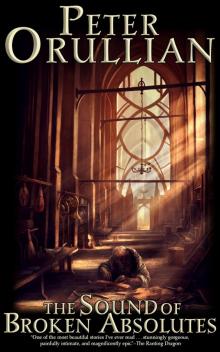 The Sound of Broken Absolutes
The Sound of Broken Absolutes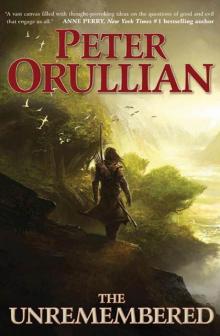 The Unremembered: Book One of The Vault of Heaven
The Unremembered: Book One of The Vault of Heaven The Hell of It
The Hell of It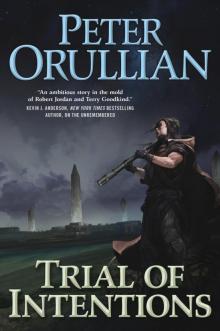 Trial of Intentions
Trial of Intentions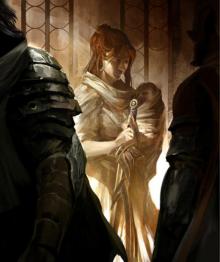 The Great Defense of Layosah
The Great Defense of Layosah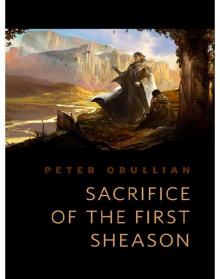 Sacrifice of the First Sheason
Sacrifice of the First Sheason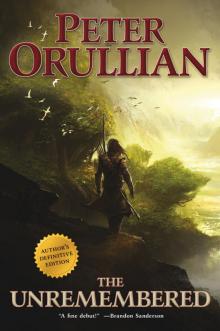 The Unremembered
The Unremembered